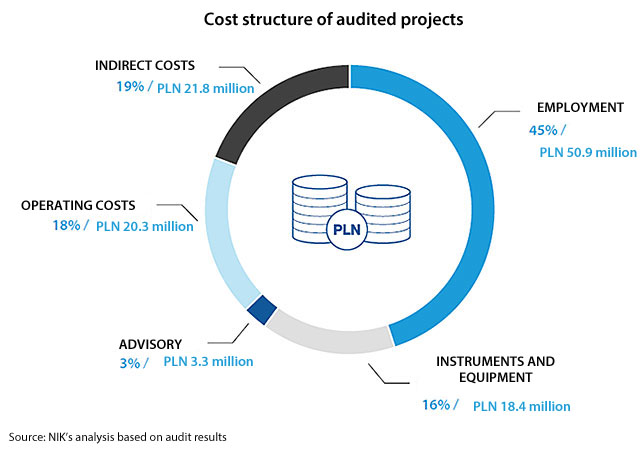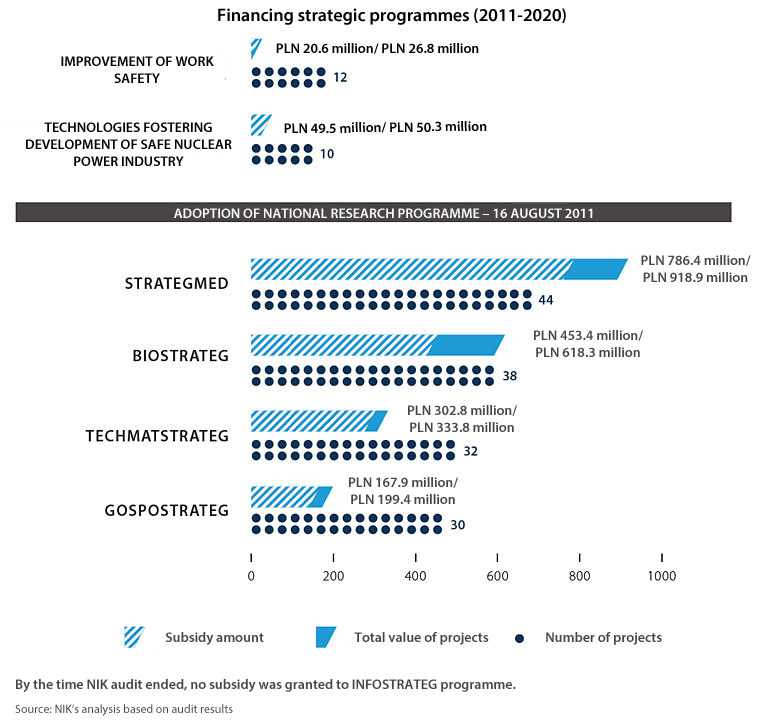The implementation of strategic programmes for scientific research in 2011-2020 helped in the development of academics but did not have much impact on the achievement of objectives defined in the scientific policy of Poland. The National Centre for Research and Development breached its own internal procedures and in some cases, also provisions of law. The Minister of Science and Higher Education did not fully use his right to supervision and evaluation.
The National Research Programme adopted in 2011 has outlined seven directions of scientific research and development works, strategic for the state: 1) new power engineering technologies, 2) civilisation diseases, new medications and regenerative medicine, 3) advanced information, telecommunication and mechatronic technologies, 4) modern material technologies, 5) natural environment, agriculture and forestry, 6) social and economic development of Poland in the conditions of globalising markets, 7) security and defence of the state.
Based on the above, the National Centre for Research and Development (NCRD) developed five strategic programmes for scientific research and development works: “Prevention and treatment of civilisation diseases - STRATEGMED”, “Natural environment, agriculture and forestry - BIOSTRATEG”, “Modern material technologies - TECHMATSTRATEG”, “Social and economic development of Poland in the conditions of globalising markets – GOSPOSTRATEG” and “Advanced information, telecommunication and mechatronic technologies - INFOSTRATEG”.
The National Research Programme (NRP) is supposed to provide funding to finance scientific research and development works of key importance for the state. The total budget of strategic programmes announced during the audit was PLN 2.3 billion.
Besides, in 2011-2020, the Centre continued strategic programmes and projects that were started before and not included in the National Research Programme.
In 2011-2020, the strategic programmes for scientific research covered 166 research projects with the subsidy value of PLN 1.8 billion. Their implementation resulted in a significant increase in the number of new research teams, scientific degrees, publications and quotations. But it did not have much impact on the achievement of objectives defined in Poland’s scientific policy. Other indicators, such as the number of companies established to commercialise new solutions, an increase in sales or licensing revenue due to industrial property rights or an increase in outlays on research and development activity (R+D) - were achieved to a small extent.
The NIK audit of STRATEGMED programme in 2017 showed that the programme objectives and indicators were not developed properly. NCRD did not ensure consistency between the primary and specific objectives. According to NIK, that is the reason why the primary objective of STRATEGMED programme, that is significant progress in fighting civilisation diseases and regenerative medicine based on the Programme results, may be difficult or even impossible to achieve.
Two programmes - GOSPOSTRATEG and INFOSTRATEG – were developed with due diligence. When preparing TECHMATSTRATEG and BIOSTRATEG programmes, against the 2010 ordinance of the Minister of Science and Higher Education on task execution mode by NCRD, not all required risks were defined.
The implementation of direction 1 (new technologies in energy) was not even started, whereas implementation of direction 3 (advanced information, telecommunication and mechatronic technologies) did not go beyond the preliminary stage.
The primary and specific objectives of four programmes: BIOSTRATEG, TECHMATSTRATEG, GOSPOSTRATEG and INFOSTRATEG were logically consistent with specific objectives adopted in those programmes, result and impact.
Some tasks related to funding and management of four programmes: STRATEGMED, BIOSTRATEG, TECHMATSTRATEG and GOSPOSTRATEG were allocated by NCRD to a separate legal entity - NCRD+ Sp. z o.o., which was a breach of law. The management of strategic programmes for scientific research and development works as well as funding or co-funding of those programmes is a statutory task of NCRD. That could have reduced objectivity of measures taken by NCRD.
NCRD violated its own internal procedures and principles of managing strategic programmes. For instance, the Centre appointed coordinators without open competition and accepted a conflict of interests by not preventing the involvement of steering committee members in evaluating and changing projects.
In 2011-2020, ten competitions were carried out and 166 projects were subsidised (PLN 1.8 billion in total). Though, the first GOSPOSTRATEG competition was not prepared properly – the budget units’ limitations in running projects as part of this programme were not analysed in depth. As a result, the competition rules were changed three times, the recruitment date was postponed four times, correctly submitted applications were removed from the system, and re-recruitment was announced to their editors by email. Besides, as part of that competition, in breach of the Act on the National Centre for Research and Development, a subsidy of PLN 4.84 million was granted.

Project leaders properly founded academic consortia, spent allocated funds and adequately used scientific apparatus. In three audited projects, though, the assumed indicators were not achieved.
Also, not all expected indicators were achieved in four programmes: STRATEGMED, BIOSTRATEG, TECHMATSTRATEG and GOSPOSTRATEG. However, final results will be evaluated up to five years after their closure. The values of indicators in annual reports were based on non-verified (and thus not very credible) declarations of project leaders. NCRD did not compare the indicator data with the previous reporting period. That approach made it impossible to analyse the increasing or decreasing tendency of their values, to establish its causes and possible response of the Centre to unfavourable phenomena.
The low level of STRATEGMED indicators poses a threat that their target values will not be achieved. Besides, solutions obtained as part of this programme are not very innovative. In BIOSTRATEG programme no breakthrough technologies were generated, either.
The support costs of strategic programmes are increasing (e.g. costs of expert opinions, support costs of steering committees). They are covered from subsidies for specific beneficiaries.
NCRD systematically evaluates strategic programmes and updates their assumptions and schedules. However, it fails to properly monitor their implementation progress which prevents the conduct of corrective actions.
None of the audited strategic programmes implemented under the NRP was completed. NCRD made the ex-post evaluation (related to the programme results and reasons why its objectives were not met) for five programmes and strategic projects carried out outside the NRP.
Financial participation of entrepreneurs in projects implemented as part of strategic programmes totalled PLN 0.27 billion. As for the Smart Growth Operational Programme 2014-2020, financial interest of entrepreneurs amounted to PLN 9.31 billion.

The Minister ensured funding of strategic programmes and exercised supervision over NCRD, accepting its reports on the programmes’ implementation and controlled them to a limited extent. However, the Minister did not use opinions or consultations of the Scientific Policy Committee, his advisory body in the area of Poland’s scientific policy.
The Minister did not fully verify if the costs of implementing and supporting strategic programmes, planned by NCRD, were justified. Besides, costs were not verified as a result of bad solutions (it was assumed that the costs of supporting individual tasks are the same).
Apart from that, the Minister failed to evaluate the impact of strategic programmes on the implementation of Poland’s scientific policy, nor did he evaluate the NRP.
Recommendations
to the Minister of Education and Science:
- to increase supervision of preparation, implementation and support of strategic programmes by NCRD, particularly in financial terms and in view of the number of controls conducted in the Centre;
- to make comprehensive evaluation of effects of the National Research Programme and to use its results in works on the assumptions of Poland’s scientific policy developed in accordance with applicable law.
to the National Centre for Research and Development
- to properly prepare strategic programmes for scientific research and development works as well as competitions;
- to verify tasks commissioned to NCRD+ sp. z o.o. and make sure they are consistent with the scope of tasks to be performed by that entity, in line with applicable law;
- to appoint coordinators of strategic programmes for scientific research and development works in line with the programmes’ assumptions;
- to pay funds in line with the payment schedule;
- to grant funds based on approved applications from the ranking list;
- to properly prepare reports on the implementation of strategic programmes, based on verified data on indicators performance.
to project leaders
- to develop periodic reports on the projects implementation in a timely and reliable manner;
- to achieve target values of all indicators planned in the project;
- to ensure a control mechanism over the projects implementation.


